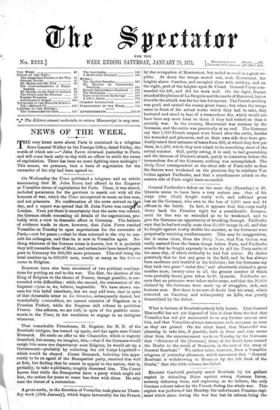A great sortie, in the direction of Versailles, took place
on Thurs- day week (19th January), which began favourably for the French A great sortie, in the direction of Versailles, took place on Thurs- day week (19th January), which began favourably for the French
by the occupation of Montretout, but ended as usual in a great re- pulse. At dawn the troops moved out, took Montretout, the heights above Garchea, and occupied them with artillery, and on the right, part of the heights upon St. Cloud. General Vinoy com- manded the left, and did his work well. On the right, Ducrot attacked theplateau of La Bergerie and the castle of Buzenval, but on this side the attack was far too late for success. The French artillery was good, and caused the enemy great losses ; but when the troops came in front of the actual works which they had to take, they hesitated and stood in face of a tremendous fire, which would not have been any more fatal to them if they had rushed on than it actually was. In the evening Montretout was retaken by the Germans, and the sortie was practically at an end. The Germans say that 1,000 French corpses were found after the sortie, besides the wounded and prisoners, and on their own side they have gra- dually raised their estimate of losses from 200, at which they first put them, to 1,300, which they now admit to be something short of the actual number. Still, partly owing, it is said, to bad generalship and the lateness of Ducrot's attack, partly to hesitation before the tremendous fire of the Germans, nothing was accomplished. The Daily News' correspondent at the other side of Paris tells us that the Saxons were weakened on the previous day to reinforce Von Goben against Faidherbe, and that a simultaneous attack on the• eastern side of Paris might have succeeded.


































